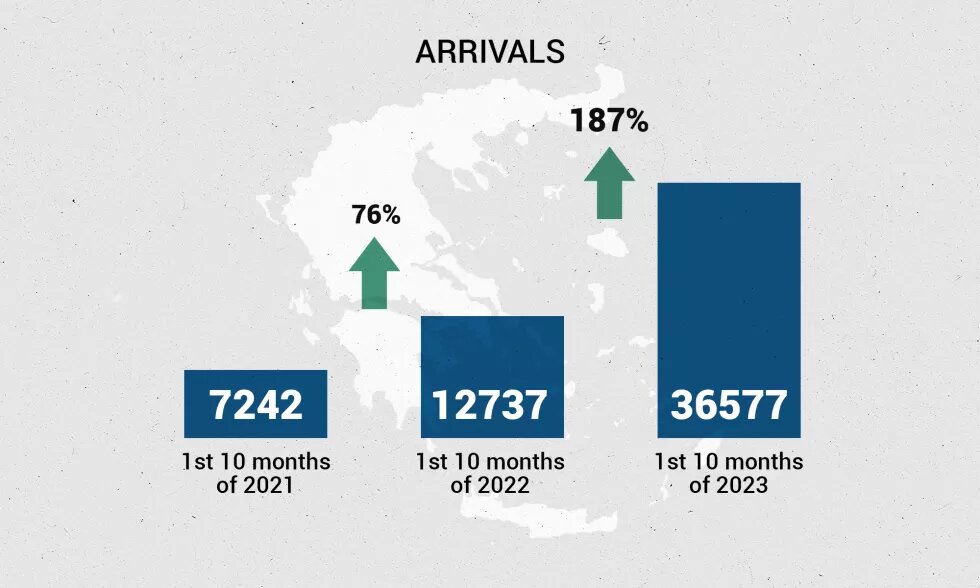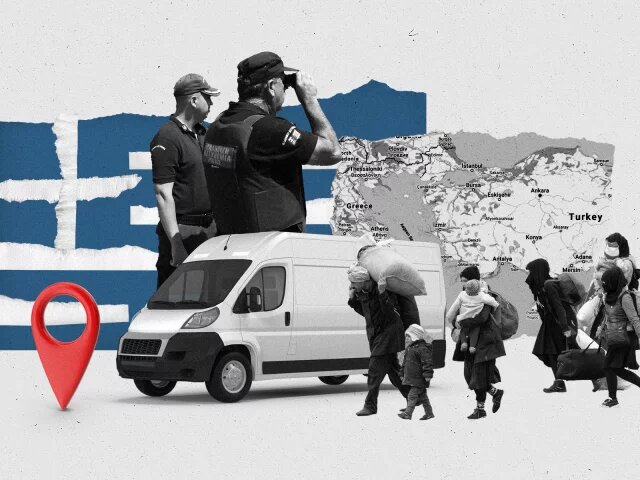
In Greece, Hungary and Poland, there are people who believe fences protect them from external threats, in whatever form those threats might come.
Along the borders of each of these states, huge sums of money have been spent to keep out those who would seek asylum; the fences differ in size and design, but they have one thing in common – they are more a political symbol than an actual barrier.
A closer look at the fences, at the people who man them, who live alongside them, who try to breach them, gives the lie to government claims that fences stop migration. They don’t; they just make lives more miserable.
In Greece, the smugglers in the borderland aren’t stupid. The fence has made it harder for the refugees, but more lucrative for the smugglers. They drop a pin and a driver follows it to pick-up the refugees.

The smugglers aren’t stupid.
“Orestiada has a farmers’ market every Tuesday, and most farmers use white vans. Smugglers have also started using white vans to take advantage of this,” said an Orestiada police officer, who has spent the best part of two decades securing Greece’s border with Turkey.
And their services vary, from standard to luxury.
“Apart from regular transfers, smugglers also provided VIP services with cars like BMW X5s and X6s.”
Orestiada is the second biggest city in the Evros region of northeastern Greece after Alexandroupoli. Evros is an agricultural region, home to the dense Dadia forest and the Evros river, also known as the Maritsa, that forms the border between Greece and Turkey.
This isolated region has long felt neglected by the state and some of the people living there derive a sense of purpose from protecting the border.
In late February 2020, a crisis broke out in Kastanies, another border town north of Orestiada and facing the Turkish city of Edirne, when thousands of refugees tried to rush the border and were met with force from the Greek army, anti-riot police and armed civilians, firing tear gas and bullets.
One person was killed and seven people wounded by bullets fired from the Greek side, according to an analysis published by Forensic Architecture.
Greece first built a section of fencing on its border with Turkey in 2012. It was extended in 2021 and a new 35-km stretch is currently under construction having kicked off with a ceremony broadcast live from the border.
A new 35 km stretch of the Greek border fence is currently under construction - Birn Balkans
 Watch on YouTube
Watch on YouTube
Since 2020, the officer told BIRN, they mainly use cars; some have even been known to fly to Alexandroupoli and rent cars, given rentals usually escape attention; later, they used trucks with Polish plates since a lot of freight trade in the region comes from Poland.
The latest trick is pinpointing via Google Maps and advertising on TikTok. BIRN managed to determine the exact location of one particularly smuggling pickup.
The latest trick of people smuggling in Greece is pinpointing via Google Maps and advertising on Tik - Birn Balkans
 Watch on YouTube
Watch on YouTube
“On the Turkish side, the smuggler sends a pin for drop location using an app. The location is usually near a forest road. The driver comes, picks the people up, turns around and leaves,” the police officer told BIRN.
Longer fences, more guards, tighter surveillance
BIRN managed to determine the exact location of one particular smuggling pickup - Birn Balkans
 Watch on YouTube
Watch on YouTube
Greece’s conservative prime minister, Kyriakos Mitsotakis, has called the extension to the border fence “not cheap, but necessary”.
TERNA, one of the companies in the consortium building the fence, has close government ties via its president since 2011, Michalis Gourzis, father-in-law of Greece’s current foreign minister, Giorgos Gerapetritis.
TERNA is also responsible for increasing capacity at the Evros reception centre and upgrading asylum seeker camps on the islands of Chios and Lesvos to the tune of 132 million euros. Gourzis left the presidency of TERNA in November, two months after he bought 200,000 shares in the company for 2,636,000 euros.
EU support comes in the form of TAMEY, a European Commission-funded programme that has helped fund the recruitment of 472 out of 1,477 coastguards over the past three years. Each officer serves for a limited period of two years. According to TAMEY documents, none of the 472 recently recruited officers are employed in the border area of Evros.
Greece has also deployed drones, noise cannons and artificial intelligence to help secure its borders.
More dangerous profit – Same number of asylum seekers
“I don’t necessarily want to arrest people; sometimes I just want to disrupt smuggling,” the police officer told BIRN.
“The drivers are mostly minors. They are not the real smugglers. We know that because we see them in the pick-up trucks through thermal cameras. Their underage status may be the reason for some accidents. Sometimes, they get confused and drive in the opposite direction on the motorway.”
Christiana Kavadia, a lawyer at the Greek Refugee Council, told BIRN that refugees use the Dadia forest in Evros to hide from thermal cameras. The greater the density of the forest, the less chance of being caught.
In the summer of 2023, a fire burned for 17 days in the forest, destroying 810,000 hectares and killing 18 Syrian refugees, including two children.
Some died holding onto one another in a farmhouse. According to the New York Times, at least 12 of the victims had been arrested by the Greek border police and pushed back into Turkey.
In 2023, a fire in the Dadia forest killed 18 refugees, including two children - Birn Balkans
 Watch on YouTube
Watch on YouTube
The Greek government says that in 2022 it prevented more than 250,000 people from irregularly crossing the border, but the number of asylum seekers is rising.
Between January and October 2023, 36,557 people requested asylum in Greece, compared to 12,737 in 2022, an increase of 187 per cent, based on figures from the Ministry of Migration.
In 2022, 965,665 people requested asylum in the EU, 52 per cent up on 2021 and the highest number since 2016.
According to the Missing Migrants Project, 107 people have died on the Turkey-Europe land route since 2018. The alternative route is via Calabria in southern Italy, crossing the entire Aegean Sea from Turkey to avoid pushbacks. The route is fraught with danger; in June 2023, a fishing trawler piloted by smugglers from Libya and bound for Italy sank off the coast of Pylos, southern Greece, killing more than 500 migrants and refugees.
No real debate about safe passage
Lefteris Papagiannakis, director of the Greek Council for Refugees, believes the debate in Greece is going in the wrong direction. While politicians and the media talk about the fence, there is no real debate about safe passage despite a number of deadly shipwrecks, he told BIRN.
Human trafficking is highly lucrative, he said. We are not saying that the situation will be resolved without a Greek or European migration policy, but we would at least abandon the hypocrisy, whether it is about the fence or the fight against smuggler networks.”
“If it weren’t that border control, it wouldn’t be that party”
The smuggling is getting more sophisticated with time, a police officer told BIRN, adding: “If we weren’t controlling the borders, they wouldn’t be making so much money.”
An investigation by Solomon and El Pais suggests that Greek border guards have stolen more than two million euros from refugees they pushed back to Turkey, while others quit rather than take part.
Five guards were arrested in May 2023 on suspicion of collaborating with smugglers and remain behind bars awaiting trial. A police officer, who spoke to BIRN on condition of anonymity, said the five were caught out by a police sting operation. “The state had ‘created’ smugglers with empty fishing boats, who have been smuggled too, in order to find the heads of the smugglers in Turkey,” he said. BIRN was unable to corroborate the claim.
This article was first published on 29 February 2024 on Balkan Insight.
It has been produced with the financial support of the Heinrich-Böll-Stiftung Thessaloniki.
Its content is the sole responsibility of the author and does not represent the Foundation’s views and opinions.

